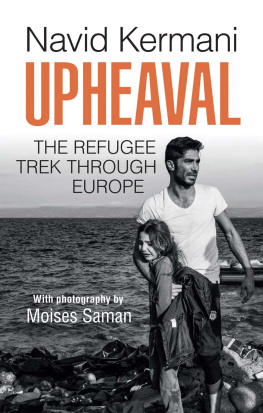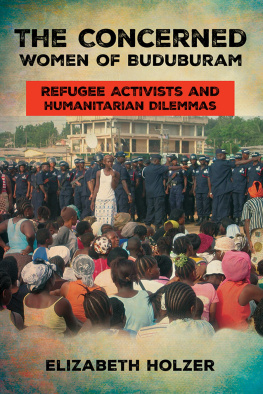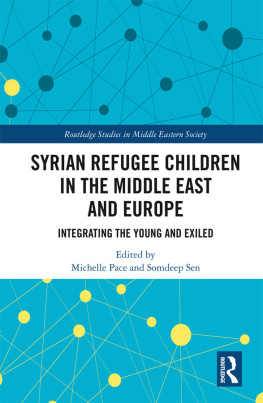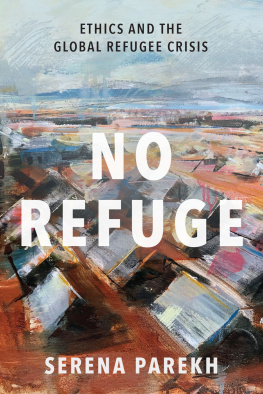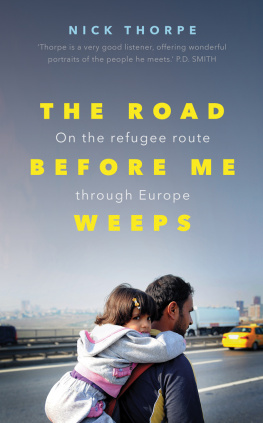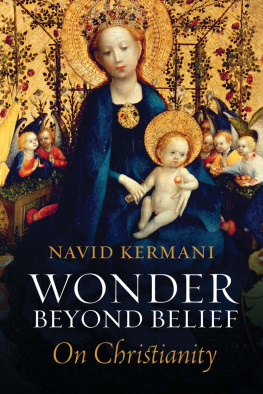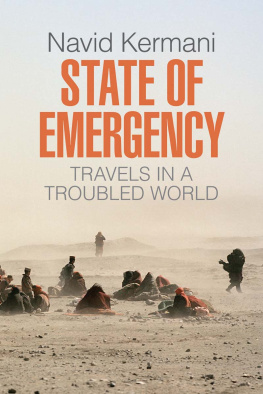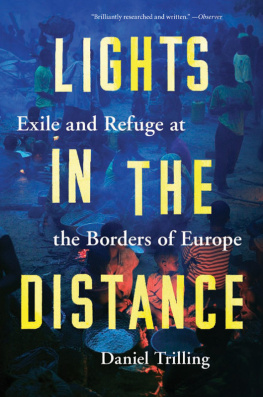Contents
Guide
Pages

Upheaval
The Refugee Trek through Europe
Navid Kermani
With photography by Moises Saman
Translated by Tony Crawford
polity
First published in German as Einbruch der Wirklichkeit: Auf dem Flchtlingstreck durch Europa Verlag C.H. Beck oHG, Munich, 2016
This English edition Polity Press, 2017
Photography Moises Saman/Magnum Photos
Map Peter Palm, Berlin/Germany
Polity Press
65 Bridge Street
Cambridge CB2 1UR, UK
Polity Press
350 Main Street
Malden, MA 02148, USA
All rights reserved. Except for the quotation of short passages for the purpose of criticism and review, no part of this publication may be reproduced, stored in a retrieval system or transmitted, in any form or by any means, electronic, mechanical, photocopying, recording or otherwise, without the prior permission of the publisher.
ISBN-13: 978-1-5095-1871-5
A catalogue record for this book is available from the British Library.
The publisher has used its best endeavours to ensure that the URLs for external websites referred to in this book are correct and active at the time of going to press. However, the publisher has no responsibility for the websites and can make no guarantee that a site will remain live or that the content is or will remain appropriate.
Every effort has been made to trace all copyright holders, but if any have been inadvertently overlooked the publisher will be pleased to include any necessary credits in any subsequent reprint or edition.
For further information on Polity, visit our website: politybooks.com
Acknowledgements
From 24 September to 2 October 2015, Moises Saman and I travelled from Budapest to Izmir on assignment for the German news weekly Der Spiegel. A much shorter version of our report about a third of the present text appeared in the 11 October issue. I owe thanks to many people: Lothar Gorris, head of the magazines cultural section, Matthew Krug, photography editor, and Gordon Bertsch of Der Spiegels travel office all gave us the best support possible. Alex Stathopoulos of Pro Asyl, Ramona Lenz and Thomas Gebauer of medico international, and Hagen Knopp of Watch the Med helped us plan our route and put us in touch with people along the way. Basak Demir helped me prepare for the visit to Turkey. Nicole Courtney-Leaver got us the necessary credentials and was very helpful in many other matters. My assistant Florian Bigge kept us supplied during the trip with current information and situation reports from Germany. The writer Vladimir Arsenijevi and the cultural manager Milena Beri of Belgrade picked us up at the HungarianSerbian border and accompanied us as far as Thessaloniki Airport. Vladimir and Milena were much more than our drivers, interpreters and guides: they gave us the invaluable gifts of their insights, their inexhaustible contacts throughout the Balkan region, and most of all their friendship. Finally, I thank my editor at C. H. Beck, Dr Ulrich Nolte, and his assistant Gisela Muhn, who supervised the book version.
Immediately after we left Lesbos, my brother Khalil and my sister-in-law Bita arrived there and initiated an aid project for the refugees. See http://avicenna-hilfswerk.de/avicenna-english/ to find out more or to donate.
Navid Kermani
Cologne, 10 December 2015
A Strangely Softer Germany
It was a strangely softer Germany that I left in late September 2015. In the railway stations of the big cities, between the travellers hurrying to their trains or their exits, strangers lay on green foam mats. No one chased them away or caused a fuss about the public disorder; on the contrary, local residents in yellow safety vests knelt beside the strangers to offer them tea and sandwiches or to play with their children. Outside the stations were tents and people going into them, carrying box after box food, clothing, toys, medicines donations from the populace. When other countries stopped the strangers and bullied them so badly that they tried to escape on foot along the motorways, Germany sent special trains to fetch them, and, wherever they arrived, crowds of citizens and even mayors were on the platforms to applaud them. Local newspapers and national TV networks alike told their audiences what every single German could do to help, and overnight even the most xenophobic of the German papers began recounting the strangers life stories, telling so compellingly of war, of oppression, and of the travails and dangers of their flight that it was impossible, even in the pubs, to think rescuing them a bad idea. In the towns and villages, citizens committees formed not against the new neighbours, but for them. The football clubs in the national league the Bundesliga sewed patches on their jerseys saying refugees were welcome, and the most popular actors and singers inveighed against all Germans who did not show solidarity.
Yes, there was also animosity against the strangers, there were attacks, but now the politicians leapt to the defence of the threatened refugees and visited their shelters. The chancellor herself, the hard-headed German chancellor who, just a few weeks before, had been helpless to comfort a weeping girl from Palestine, amazed everyone by an outburst of emotion as she defended the right to political asylum. Her whole government, for that matter: was this the same government that, a few months earlier, had been the loudest critic of Italys Mare Nostrum project to save boat refugees from drowning? And the state, the German administration: to provide for hundreds of thousands of new refugees within a few weeks exceeded any foreseeable contingency, and yet it was managed surprisingly well. At most there was discreet grumbling about schools being unable to use their sports halls, about furtive estimates of the costs, which might entail new debt. And what if another million refugees were to come next year, and still more the year after?
It was a strangely softer Germany I left behind, as if its greyness, usually so stiff and forbidding, was covered with powdered sugar. Just as I was leaving, I couldnt help thinking, or perhaps I already felt, how easily powdered sugar can be blown away.
A Great Migration
From the veranda of my hotel on Lesbos, I can see the Turkish coast a few kilometres away across the Mediterranean Sea. It is half past eight in the morning, and right now, as I write this sentence, the first group of refugees is coming round the bend in the lane below all of them Afghans, from their appearance and the snatches I can hear of their talk, and all men; their inflatable boat has apparently landed in Europe without major difficulties. They do not look drenched or frozen, as many other refugees do who land, for fear of the police, below cliffs or steep, overgrown slopes, or who make the crossing in boats that are desperately overcrowded. Now that they have survived the most dangerous part of their long journey, they are cheerful, positively chipper; theyre talking and joking, looking like a group of young daytrippers, carrying nothing but hand luggage at most. They dont know yet, though, that they have a steeply climbing march of several kilometres ahead of them to get to one of the buses that the United Nations refugee agency has chartered to take new arrivals to the port of Mytilene; nor have they any inkling that, because the United Nations doesnt have enough buses, most of the refugees have to walk the fifty-five kilometres to the port, with no food, no sleeping bags, no warm clothes and the sun is still glaring during the day, while the nights have grown chilly.

